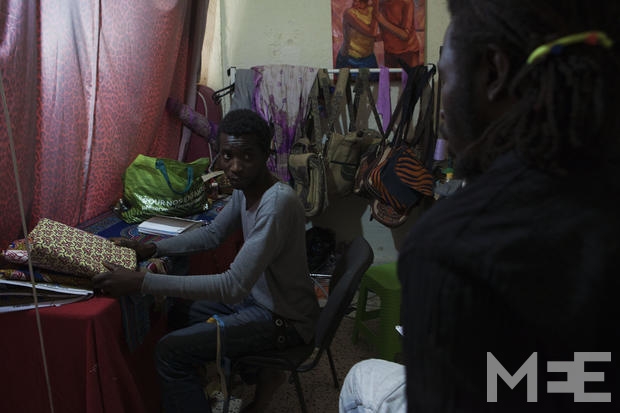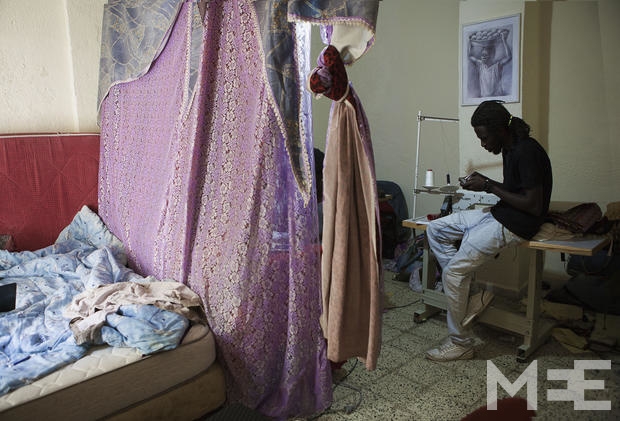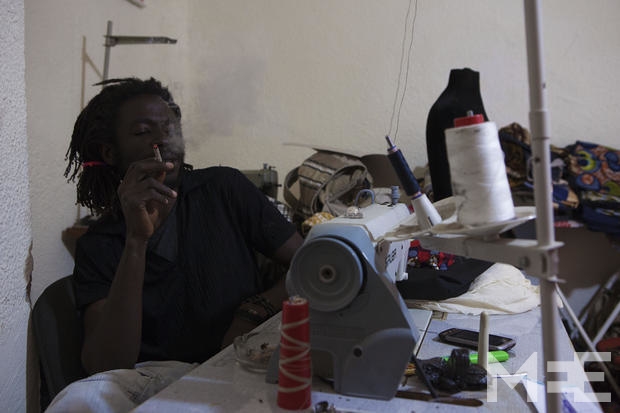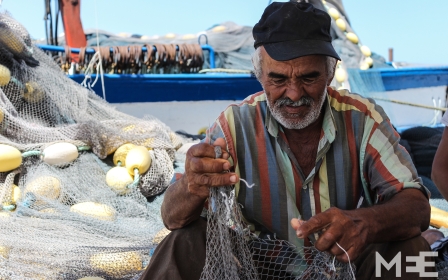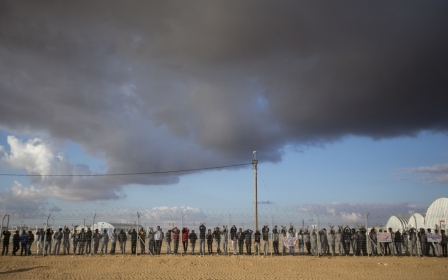‘The bags that saved my life’: A migrant's hopeful odyssey
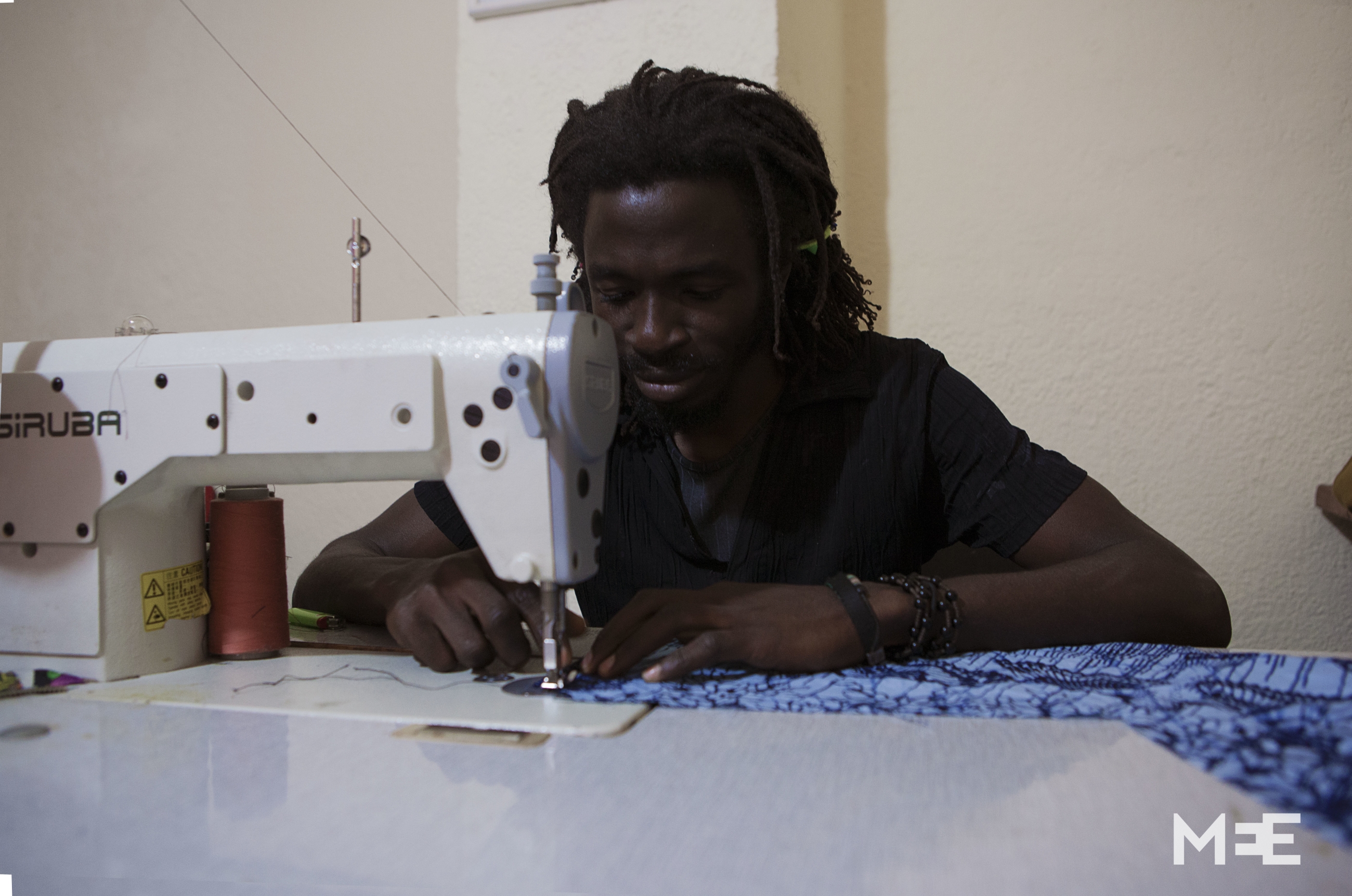
TUNIS - Amidou, a Rastafarian in his late twenties, is surrounded by sewing machines, burlap coffee bags, scattered textiles and a mountain of handmade bags.
Reggae melodies from the Ivory Coast and the African art hanging on the walls awaken nostalgic feelings; his only bridges with the homeland he had to flee.
“These bags saved my life,” the young entrepreneur tells Middle East Eye while stitching the fabrics in front of him fervently together in a small, underlit workshop in a popular neighbourhood in the heart of Tunis. The brand of his bags, made with recycled coffee sacks and textile waste from old tents, reads “Refuge”. “I will keep this name to remember how it all started,” he says determinately of the name which reminds him of his refugee lifestyle and the fact that he has now found a refuge, of sorts, in Tunisia.
Uprooted from the Ivory Cost amid the civil war in 2004, Karim Traore, or Amidou as his friends call him, left, taking with him just the few coins in his pockets and a worn photograph of his mother. There was no time for goodbyes. His personal odyssey as an irregular migrant had just begun.
Amidou fills his cup with espresso, and takes a deep breath as if to concentrate his mind. “I arrived in Burkina Faso and then moved to Mali where I lived with the Touareg. I bought a little sewing machine and I was preparing clothes for them in the desert. When I later arrived in Algeria, I paid 100 euros to “the ambassadors of the world” (passport forgers) and I became Mamadou Atara from Mali. If you could afford 50 euros more, they would give you a fake passport with your real name. After four years on the road, I arrived in Libya in 2008. The police arrested us at the borders. I told them I am a tailor; they answered, 'We need you.' I was lucky. I bought a residence permit for one year and had a blood test to verify I had no HIV.”
The studies in couture he never completed along with his business acumen became his passport to earning a good living in Libya. The state handed him 12,000 Libyan dinars ($8,761) to realise his business plan. He bought sewing machines and textiles, rented a workshop and a store, and employed four Sub-Saharans. Being well-off, Amidou even financed his Ivorian friends' dream journey to Europe.
However, the war that broke out in 2011 brought an end to his dream. “Four rebels raided my store and put a gun to my head. I was afraid they would kill me." At that time many black Africans in Libya were targeted and persecuted as they were believed to be supporting Gaddaffi, something Amidou says was a false perception fuelled by propaganda, mainly triggered by foreign media. "They took all my money and ordered me to leave immediately. I found some friends and we decided to escape Libya together,” Amidou recalls.
Exodus to Tunisia
As Amidou recalls his journey, his friend Fakoly sits next to him as they both sew their latest products with zeal. They are still flush with pride after many of their handicrafts were successfully sold out during the World Social Forum in Tunis. Amidou's compatriot had experienced his own parallel journey until their lives intersected in Libya. “We asked the sisters in the Catholic Church for money for the bus, and we crossed the desert. Tunisia was our only exit,” they say simultaneously, nodding. “We arrived in Choucha. It was winter, extremely cold; we had no toilets, no water. They kept us in the refugee camp because the government wanted to prevent Sub-Saharans from moving to the big cities.”
Soon after the collapse of Ben Ali's regime in 2011, Tunisia faced, on the one hand, young Tunisians escaping in droves towards Italy and on the other hand, several waves of people fleeing the conflict in Libya. It repatriated hundreds of thousands of refugees but 3,000 to 4,000 refugees and asylum seekers remained in Choucha refugee camp, looked after by international organisations on the Tunisian-Libyan desert border. With the new Ivorian government reconciling with former dissidents, under typical UN Refugee Agency (UNHCR) criteria, Amidou and Fakoly could be repatriated and thus their asylum claim was rejected. They spent two years in Choucha though, since they feel returning to Ivory Coast could jeopardise their lives.
In the face of difficulties to cover basic human needs, hard weather conditions, geographical and social isolation and grim future prospects, the asylum seekers in Choucha organised activities to exorcise their stress. Amidou set up a sewing workshop, attracting 300 students. The UNHCR bought them machines while an Italian volunteer equipped them with old textiles from factories, although these they were not enough to cover their needs.
“We wanted more fabrics so I came up with the idea of recycling. And what was there to be recycled? The empty tents of refugees who had left the camp,” Amidou explains. The name stamped on the bags was “Refuge”. When the delegation of the EU visited them, its members purchased all the stock as souvenirs. “We received 1,500 Tunisian Dinars (approximately US $771). It was a grand success! Many refugees bought laptops with their share. We didn't have water but we had wifi.”
For Amidou, the two years spent in Choucha were the darkest of his life. The first year, he never contacted his family as he couldn't tell them he was “imprisoned”. “I had to forget my past and not imagine my future,” he says, today bearing no traces of that bitter experience in his jolly face. Fakoly, on the other hand, never stopped dreaming of the future and said he kept learning one word of Arabic each day.
A new life?
In June 2013, the UNHCR suggested to the 300 individuals in Choucha whose refugee status had been rejected that they should seek local integration. According to the organisation, this is a legal process whereby refugees attain a wider range of rights in the host state, an economic process of establishing sustainable livelihoods and a sociocultural process of adaptation and acceptance, enabling refugees to contribute to society and live without fear of discrimination.
Around 60 migrants signed up and searched for a better life in the urban centres. The rest of them either embarked on the perilous journey across the Mediterranean Sea or continued their fight for resettlement in a third country, remaining in limbo to this day in the officially closed Choucha camp without food, water or medical services.
“They told us that we will receive a provisional residence permit but I still have no documents," Fakoly tells MEE when at the Forum for Young Entrepreneurs organised by the French Institute in Tunisia to celebrate projects for sustainable development. "We don't understand the law or the administration process. Everything you see around me was gained through personal labour. When I arrived in the city, I worked in cafes and doing odd masonry jobs. To save money, I lived in the building site for five months.”
According to Hassan Boubakri, Social Geography Professor at the University of Sousse and president of the Centre for Migration and Asylum in Tunis (CeTuMa): “Their legal status is that they are irregular and trapped in chaos. The UNHCR proposed local integration but it's the Tunisian state that is responsible for guaranteeing their rights. When the UNHCR asked the state, in 2014, to regularise these individuals, the authorities answered that 'according to Tunisian law, we cannot regularise someone who is not a refugee and has entered Tunisian territory illegally.'"
"Of course there is a contradiction here and a violation of human rights ," Boubarkri continues. "Since you offer local integration, you should then change the law. It was mere propaganda for political reasons. Those who accepted it have no access to health services, they are forced into 'black labour' and exposed to police abuses. They cannot travel nor obtain a residence permit. Lacking political will, we are stuck in a vicious circle. But before 2011, we wouldn't even put this in the public discourse even though Tunisia has been traditionally a transit point for migrants.”
The horizon of departure
Given the precarious conditions, the vast majority of those who accepted local integration left Tunis for unknown destinations while some of them still struggle to make ends meet.
When Amidou arrived in Tunis, he had almost nothing. Volunteers who had been working in Choucha camp hosted him until he could stand on his own feet. “I only had some of the bags with me and selling them I gained my first income. You see why these bags saved my life? Now I feel happy. I have my friends and I do the job that I love. But still, not obtaining the official documents is an obstacle. Shopkeepers refuse to sell my bags because of that but also because they think we steal the Tunisians' jobs.”
“This bar is not for blacks” is a phrase that echoes strongly for Amidou. Racism and disparity are omnipresent in the refugees’ lives, for example, they pay double rent compared to what a local would pay. Is Tunisia ready to integrate foreigners, especially the socially vulnerable ones? “Additionally to law reform, we have to cultivate tolerance and acceptance,” Professor Boubakri says, affirming that migrants culturally enrich society and bolster the local economy.
The sun has long ago gone down but the sewing machines in the workshop keep chanting rhythmically while new orders from clients arrive. “Even though the opportunities are not equal, we should persevere,” Fakoly tells MEE, dreaming of returning to Ivory Cost. Amidou has different plans. “Europe is my dream. I would like to create a network between Europe and Africa to promote education among the youth. I would like to end my life in any European country.”
New MEE newsletter: Jerusalem Dispatch
Sign up to get the latest insights and analysis on Israel-Palestine, alongside Turkey Unpacked and other MEE newsletters
Middle East Eye delivers independent and unrivalled coverage and analysis of the Middle East, North Africa and beyond. To learn more about republishing this content and the associated fees, please fill out this form. More about MEE can be found here.


